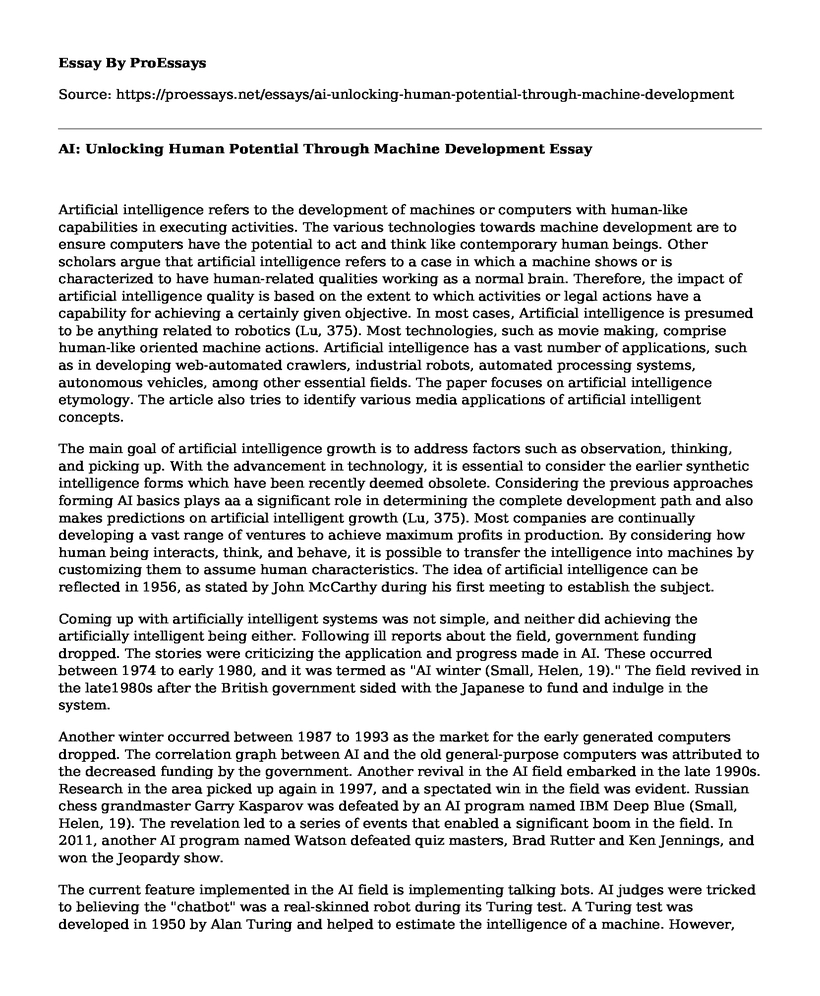Artificial intelligence refers to the development of machines or computers with human-like capabilities in executing activities. The various technologies towards machine development are to ensure computers have the potential to act and think like contemporary human beings. Other scholars argue that artificial intelligence refers to a case in which a machine shows or is characterized to have human-related qualities working as a normal brain. Therefore, the impact of artificial intelligence quality is based on the extent to which activities or legal actions have a capability for achieving a certainly given objective. In most cases, Artificial intelligence is presumed to be anything related to robotics (Lu, 375). Most technologies, such as movie making, comprise human-like oriented machine actions. Artificial intelligence has a vast number of applications, such as in developing web-automated crawlers, industrial robots, automated processing systems, autonomous vehicles, among other essential fields. The paper focuses on artificial intelligence etymology. The article also tries to identify various media applications of artificial intelligent concepts.
The main goal of artificial intelligence growth is to address factors such as observation, thinking, and picking up. With the advancement in technology, it is essential to consider the earlier synthetic intelligence forms which have been recently deemed obsolete. Considering the previous approaches forming AI basics plays aa a significant role in determining the complete development path and also makes predictions on artificial intelligent growth (Lu, 375). Most companies are continually developing a vast range of ventures to achieve maximum profits in production. By considering how human being interacts, think, and behave, it is possible to transfer the intelligence into machines by customizing them to assume human characteristics. The idea of artificial intelligence can be reflected in 1956, as stated by John McCarthy during his first meeting to establish the subject.
Coming up with artificially intelligent systems was not simple, and neither did achieving the artificially intelligent being either. Following ill reports about the field, government funding dropped. The stories were criticizing the application and progress made in AI. These occurred between 1974 to early 1980, and it was termed as "AI winter (Small, Helen, 19)." The field revived in the late1980s after the British government sided with the Japanese to fund and indulge in the system.
Another winter occurred between 1987 to 1993 as the market for the early generated computers dropped. The correlation graph between AI and the old general-purpose computers was attributed to the decreased funding by the government. Another revival in the AI field embarked in the late 1990s. Research in the area picked up again in 1997, and a spectated win in the field was evident. Russian chess grandmaster Garry Kasparov was defeated by an AI program named IBM Deep Blue (Small, Helen, 19). The revelation led to a series of events that enabled a significant boom in the field. In 2011, another AI program named Watson defeated quiz masters, Brad Rutter and Ken Jennings, and won the Jeopardy show.
The current feature implemented in the AI field is implementing talking bots. AI judges were tricked to believing the "chatbot" was a real-skinned robot during its Turing test. A Turing test was developed in 1950 by Alan Turing and helped to estimate the intelligence of a machine. However, critics and most experts say that the Turing test is not the best method to measure artificial intelligence (Small, Helen, 19). This is because the chatbot was able to dodge some questions during the test. The critics say that the Turing test is imperfect as it looks at the external behaviors of a machine. The test should be upgraded as the field is dynamic and ever-growing, requesting a room for a more reliable test. The area of AI has developed, and it does not intend to build and rely on humanlike intelligence, it has been able to incorporate different behaviors to the machines to be exhibited in different environments.
Works Cited
Lu, Huimin, et al. "Brain intelligence: go beyond artificial intelligence." Mobile Networks and Applications 23.2 (2018): 368-375. https://link.springer.com/article/10.1007/s11036-017-0932-8Small, Helen. "Artificial Intelligence: George Eliot, Ernst Kapp, and the Projections of Character." 19: Interdisciplinary Studies in the Long Nineteenth Century 29 (2020). https://19.bbk.ac.uk/article/id/1993/
Cite this page
AI: Unlocking Human Potential Through Machine Development. (2023, May 30). Retrieved from https://proessays.net/essays/ai-unlocking-human-potential-through-machine-development
If you are the original author of this essay and no longer wish to have it published on the ProEssays website, please click below to request its removal:
- Film Analysis Essay: The Apology
- Colonial America: A Land of Racial, Cultural and Regional Diversity - Essay Sample
- John Coltrane Quartet's Jazz: Evolving Music Industry
- Case Study on Fashion Network
- Always Be My Maybe: Exploring Asian-American Socioeconomic Aspects - Essay Sample
- Paper Example on Theater as a Medium for Change: Amy Fritsche's Insight
- Processing Customer Payments







